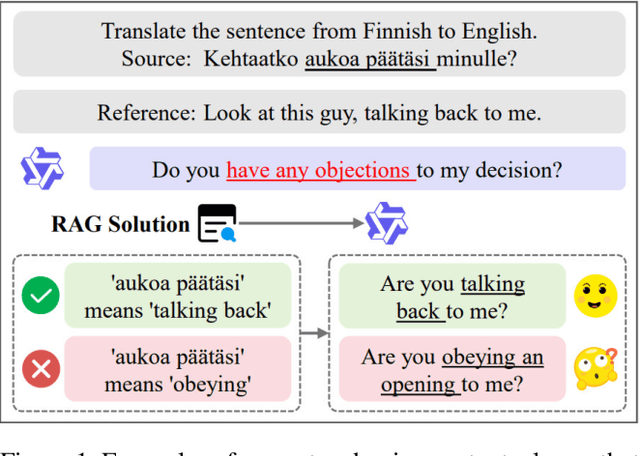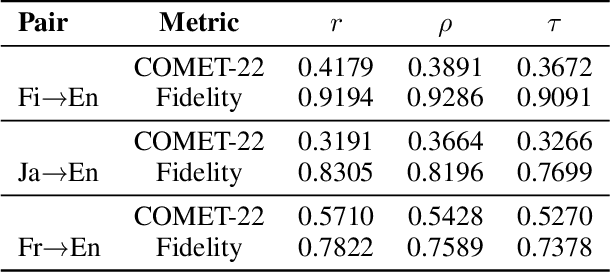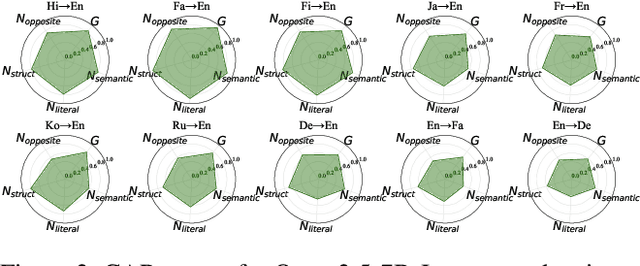Kaixin Lan
Exposing the Cracks: Vulnerabilities of Retrieval-Augmented LLM-based Machine Translation
Oct 01, 2025



Abstract:\textbf{RE}trieval-\textbf{A}ugmented \textbf{L}LM-based \textbf{M}achine \textbf{T}ranslation (REAL-MT) shows promise for knowledge-intensive tasks like idiomatic translation, but its reliability under noisy retrieval contexts remains poorly understood despite this being a common challenge in real-world deployment. To address this gap, we propose a noise synthesis framework and new metrics to evaluate the robustness of REAL-MT systematically. Using this framework, we instantiate REAL-MT with Qwen-series models, including standard LLMs and large reasoning models (LRMs) with enhanced reasoning, and evaluate their performance on idiomatic translation across high-, medium-, and low-resource language pairs under synthesized noise. Our results show that low-resource language pairs, which rely more heavily on retrieved context, degrade more severely under noise than high-resource ones and often produce nonsensical translations. Although LRMs possess enhanced reasoning capabilities, they show no improvement in error correction and are even more susceptible to noise, tending to rationalize incorrect contexts. We find that this stems from an attention shift away from the source idiom to noisy content, while confidence increases despite declining accuracy, indicating poor calibration. To mitigate these issues, we investigate training-free and fine-tuning strategies, which improve robustness at the cost of performance in clean contexts, revealing a fundamental trade-off. Our findings highlight the limitations of current approaches, underscoring the need for self-verifying integration mechanisms.
FOCUS: Forging Originality through Contrastive Use in Self-Plagiarism for Language Models
Jun 02, 2024Abstract:Pre-trained Language Models (PLMs) have shown impressive results in various Natural Language Generation (NLG) tasks, such as powering chatbots and generating stories. However, an ethical concern arises due to their potential to produce verbatim copies of paragraphs from their training data. This is problematic as PLMs are trained on corpora constructed by human authors. As such, there is a pressing need for research to promote the generation of original content by these models. In this study, we introduce a unique "self-plagiarism" contrastive decoding strategy, aimed at boosting the originality of text produced by PLMs. Our method entails modifying prompts in LLMs to develop an amateur model and a professional model. Specifically, the amateur model is urged to plagiarize using three plagiarism templates we have designed, while the professional model maintains its standard language model status. This strategy employs prompts to stimulate the model's capacity to identify non-original candidate token combinations and subsequently impose penalties. The application of this strategy is integrated prior to the model's final layer, ensuring smooth integration with most existing PLMs (T5, GPT, LLaMA) without necessitating further adjustments. Implementing our strategy, we observe a significant decline in non-original sequences comprised of more than three words in the academic AASC dataset and the story-based ROCStories dataset.
Is ChatGPT a Highly Fluent Grammatical Error Correction System? A Comprehensive Evaluation
Apr 04, 2023Abstract:ChatGPT, a large-scale language model based on the advanced GPT-3.5 architecture, has shown remarkable potential in various Natural Language Processing (NLP) tasks. However, there is currently a dearth of comprehensive study exploring its potential in the area of Grammatical Error Correction (GEC). To showcase its capabilities in GEC, we design zero-shot chain-of-thought (CoT) and few-shot CoT settings using in-context learning for ChatGPT. Our evaluation involves assessing ChatGPT's performance on five official test sets in three different languages, along with three document-level GEC test sets in English. Our experimental results and human evaluations demonstrate that ChatGPT has excellent error detection capabilities and can freely correct errors to make the corrected sentences very fluent, possibly due to its over-correction tendencies and not adhering to the principle of minimal edits. Additionally, its performance in non-English and low-resource settings highlights its potential in multilingual GEC tasks. However, further analysis of various types of errors at the document-level has shown that ChatGPT cannot effectively correct agreement, coreference, tense errors across sentences, and cross-sentence boundary errors.
 Add to Chrome
Add to Chrome Add to Firefox
Add to Firefox Add to Edge
Add to Edge